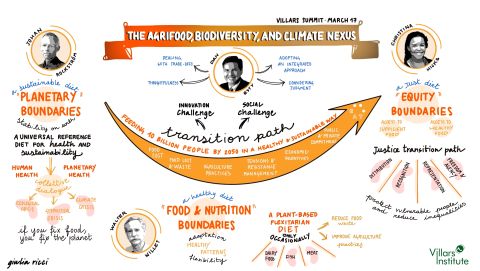Ideas from the Speakers
Delivering a sobering but important message to the Summit, the speaker explained the concept of planetary boundaries and warned that humanity is on a path to irreversibly exceeding many of them, spurring disastrous feedback loops and global catastrophe.
Addressing the current climate of doubt, he noted that the Intergovernmental Panel on Climate Change has concluded unequivocally that human activity is causing the climate crisis and putting the planet’s stability, resilience, and life-support systems at increasing risk. This is no longer vague science – it’s a lived reality for many. Natural disasters made 2023 the most expensive year ever for insurance, with climate change sharply increasing such risks. Having transgressed six of the nine planetary boundaries, we are damaging the environment’s ability to buffer shocks. Treating this “sick patient” is now an absolute imperative.
To those still profiting from the heavily polluting and high-emission fossil fuel industry, the speaker declared that the time for decisive action is now. Ample scientific evidence indicates that we face serious risks within the next 5 to 10 years. Economic projections likewise show that continuing with business as usual will lead to a 19% drop in global income by 2050 and costs of $38 trillion per year. Simply, it is time to integrate planetary boundaries into financial decision-making. Failing to do so risks triggering irreversible tipping points, such as the collapse of ice sheets, the loss of rain forests, the thawing of permafrost, and shifts in ocean currents.
Furthermore, it is crucial that companies continue their efforts despite the costs during this turbulent transition phase. A long-term perspective must be adopted when managing the costs of compliance-based reporting. To remain competitive, companies will increasingly need to factor in planetary boundaries; growing evidence shows that this approach is a more modern, strategically sound, technologically advanced and profitable pathway.
Finally, we must not be naïve about the growing headwinds of populism and climate denialism that threaten reason and progress worldwide. Despite the dominant media narratives, opinion polls show that public support for climate action remains strong and widespread. Additionally, the fact that some states in the US continue to advance decarbonization efforts despite federal resistance demonstrates that it is more cost-effective and economically sensible. Going forward, one of the most difficult diplomatic challenges will be ensuring that the US and OECD bloc take responsibility for their share and provide support to the Global South.








